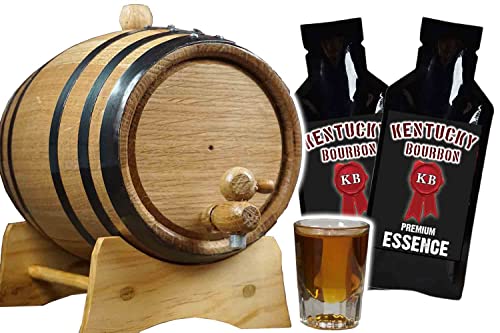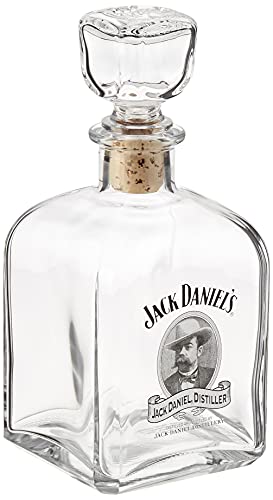Hey there! This site is reader-supported and we earn commissions if you purchase products from retailers after clicking on a link from our site.
When it comes to alcohol and the fermentation process, you may be wondering how it will affect the sugar content. As such, when you drink alcohol then you may wonder what the sugar intake will be. This being especially true if you have high blood pressure and therefore how it may impact your blood sugar level. Of course, too much alcohol consumption will inevitably be unhealthy even at the legal drinking age. However, even moderate alcohol intake may be something you are concerned about if it turns out that these are particularly sugary drinks. With that in mind then, you may be wondering, does whiskey have sugar and how much?
Table of Contents
- Is There Any Sugar In Whiskey?
- How Much Sugar Is There In Whiskey?
- The Typical Nutritional Value Of Whiskey
- How Does The Creation Of Whiskey Affect Sugar Levels?
- Answered: Does Whiskey Have Sugar and How Much?
- FAQ – Does Whiskey Have Sugar and How Much?
Is There Any Sugar In Whiskey?
When it comes to sugar in whiskey, you may be aware that the fermentation process will typically include the fermentation of sugar. Naturally, though, the sugar added to the creation of an alcoholic drink will be consumed by this process. Additionally, the distillation process through which liquors like whiskey go through can also burn away any remnants of sugar. As such, you would be forgiven for believing that whiskey will not contain any sugar at all.
However, this is not necessarily the case. The reason is that whisky will likely have slightly more than just a simple trace amount of sugar. Additionally, whilst much of the sugar will be removed by the aforementioned processes distilled spirits go through, additional sugar may be added to the drink at a later date thanks to adding a mixer to it such as sugary juices.
However, there are no added sugars during the process of creating such a drink. As such then, when you are trying to do a low sugar challenge then mixed drinks of whisky and sugar-free drinks are an excellent option.
How Much Sugar Is There In Whiskey?
With the above information context in mind, you will naturally be wondering just how much sugar can typically be found within whisky. Quite commonly, many quality types of whisky will be around eighty-sixed proof. This being around forty-three percent alcohol content as proof means twice the alcohol/ethanol content per volume. As such, the amount of sugar found within such a whisky is a good baseline to go from.
That said then, your average eighty-six proof whisky will contain approximately nought point one grams of sugar per one hundred millilitres. As such, a standard forty-four millilitre shot of whisky on the rocks will contain roughly zero point zero four four grams of sugar. Meanwhile, a standard double of eighty-eight millilitres will contain around zero point zero eight eight grams of sugar.
With that in mind then, when not mixed with anything and simply served with some ice, whisky is a great low-sugar option for an alcoholic drink. As such, when avoiding drinking alcohol with added sugar, then this is a great option.
That said though, a combination that is popular around the world is whiskey and coke. Although, this is much to the chagrin of whisky enthusiasts, this is truly a winning combination in the eyes of many people. However, when you are drinking more than one drink with a mixture of whisky and coke the amount of sugar that you will consume will rapidly increase. As such, when drank in higher quantities, then this may lead to some weight gain.
When it comes to drinking whisky and coke, the coke will bring in much more sugar. In particular, a two hundred and fifty-millilitre standard serving for a double whisky will contain around twenty-three point seven grams of sugar. As such, this will bring the sugar content of your beverage to around twenty-three point eight grams of sugar. This is equivalent to around two tablespoons of granulated sugar.
That said though, you can still make low-sugar cocktails with whisky if you pick your mixer carefully. As such, mixers such as diet cola, club soda or low-sugar fruit juices will be the perfect choices for mixing with your whisky or other types of alcoholic spirits.
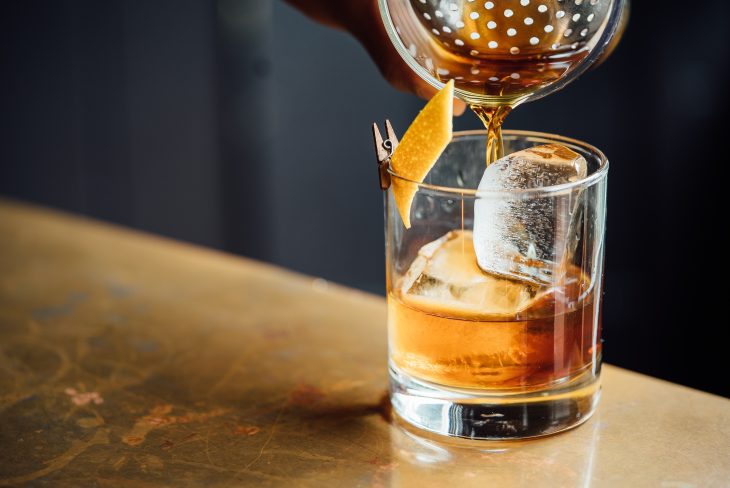
The Typical Nutritional Value Of Whiskey
Whilst there won’t be a lot of sugar found within your choice of whisky, there is also an assortment of other nutritional content found within. As such now that we’ve established that the sugar content of whisky is incredibly low, you may wonder what else can be found within. With that in mind then, below you’ll find information on the following nutritional elements found within whiskey:
- Carbohydrates In Whiskey
- Fats In Whiskey
- Proteins In Whiskey
- Alcohol Content Of Whiskey
- Vitamins And Minerals In Whiskey
- Calories In Whiskey
Calories In Whiskey
A single serving, otherwise known as a shot of whisky will contain forty-two grams, one point five ounces or forty-four millilitres of whisky. Within such a measurement of whisky though, there will be roughly one hundred calories.
This is a comparable amount of calories to other spirits of a similar nature such as rum, gin, or vodka. As such, excessive consumption of such alcoholic beverages will result in the ingestion of many calories.
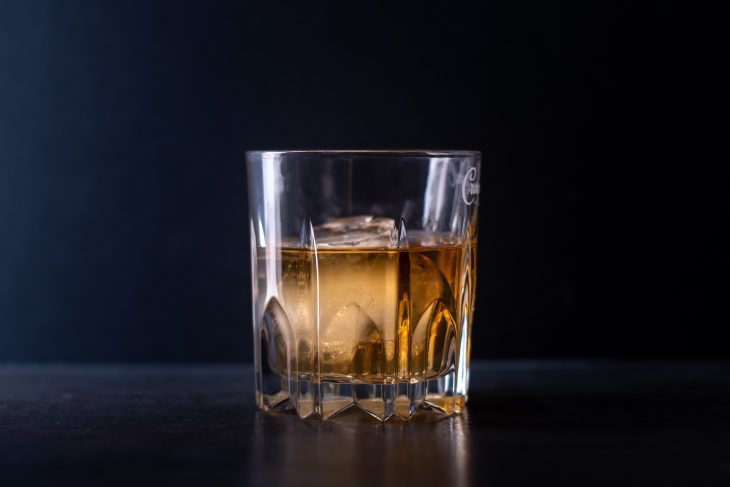
Carbohydrates In Whiskey
As mentioned above, the caloric contents of whisky are around one hundred calories per shot along with a negligible amount of sugar. Additionally, though, it also contains very little in the way of carbohydrates or fibre.
As such, since drinks like scotch whisky contain little to no carbs, they come in at a low position on the glycaemic index. This is an index that helps gauge how much the carbs in a food or drink will impact blood sugar levels.
That said though, consumption of alcohol and hard liquors, in particular, causes the body to secrete insulin. A result of this can be low blood sugar levels even when drunk in moderation.
Alcohol Content Of Whiskey
Within a shot of whisky, there is a wide range of potency potentials in terms of alcohol. On average though, the alcohol found within something like scotch will be roughly fourteen grams. Assuming of course that the whisky has not been mixed with any other type of beverage rather than neat or on the rocks.
When it comes to the calories contained within alcohol, on average alcohol contains around seven calories per gram. Truly though, these are the only calories that will be found within whisky. As such, as mentioned above, the calories contained within the scotch whisky are around one hundred calories per shot.
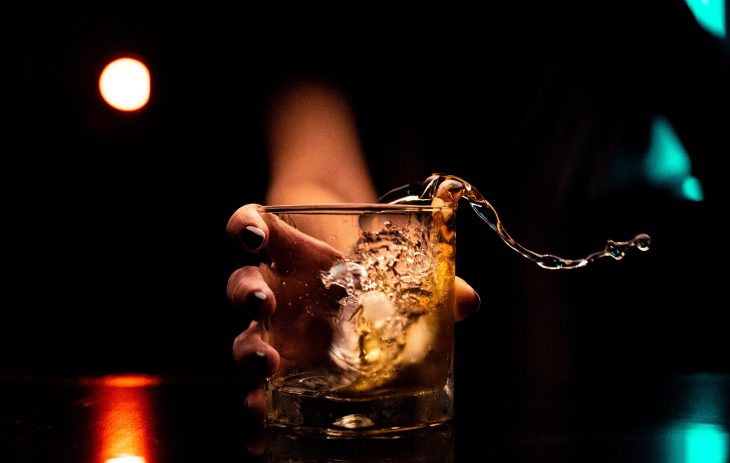
Vitamins And Minerals In Whiskey
Within a glass of whisky, there is contained an assortment of different minerals. However, these will only be found within trace amounts. As such, you will not be able to gain any micronutrients of substance when it is consumed.
Fats In Whiskey
When it comes to the fat contents of whisky, you may be happy to discover that it contains little to no fats. However, on the ketogenic or another high-fat diet, you may find yourself somewhat disappointed.
Proteins In Whiskey
Like with fats, there will be no proteins in whisky. As such, just like any other alcohol, it will be a particularly great source of nutrition.
How Does The Creation Of Whiskey Affect Sugar Levels?
As we’ve established above, whisky will typically not contain more than nought point one grams of sugar per one hundred millilitres. However, the amount of sugar found with different types of sugar can vary depending on the processes used to create it. These production factors include the following factors:
- Fermentation
- Distillation
- Ageing
- Caramel Colouring
- Added Sugar
Fermentation
During the process of fermentation, the yeast will eat the sugars that are found within barley along with any other grains that are used for making a scotch whisky mash. The process of doing so being what creates the ethanol that makes the whisky alcoholic. In addition, it will also lead to the creation of the congeners that are the byproduct of this process.
As a result, the process will remove the sugars. This though will mean that the ultimate sugar levels will become completely negligible. That said though, subsequent processes may bring sugar back into the whisky.
Distillation
Once the fermentation process has been completed, the wort will have sunken to the bottom of the pot. The wort is the remnants of sugars, yeasts and grains. As such, these parts of the mix will not be carried over to the distillation process.
The process of distillation involves low-temperature boiling of the remaining mixture. This results in the release and cooking away of the majority of the excess sugars. As such, many whiskies of quality will go through the process of distillation several times. The purpose of which is to remove the excess wort and sugar from the whisky mixture.

Ageing
Ageing is a process that is done in order to introduce delicious flavours from the container to the whisky itself. Meanwhile, it will also mellow out the harsher tastes that are inherently present in the unaged whisky.
When undergoing the ageing process, the whisky will be stored in wooden barrels, typically made from oak. Before being used for the purpose of ageing though, whisky barrels or casks will be toasted and charred. The result of which being a chemical process that degrades the hemicelluloses of the wood. Thereby making the wood reactive.
The result of which is that the wood will provide oaky and smokey flavours to the whisky. However, it will also release some sugars into the whisky due to how the ethanol contained within the whisky will react with the toasted oak that makes up the barrel. The result of which is some extra sugars ending up in the whisky.
Caramel Colouring
Caramel colouring is an addition that is incorporated into many different types of whisky. In particular, though many cheaper whiskies will include approximately two-point-five percent caramel colouring in order to have the correct lustre expected of a well-aged whisky. However, even some high-end scotches or bourbons will include a small amount of caramel colouring. Although, whisky makers who pride themselves on following traditional whisky-making methods will often abstain from doing so.
Now of course, when added to whisky, caramel colouring is used in order to add a darker well-aged appearance to the whisky. However, an invariable byproduct of adding such a caramel colouring is that it will bring extra sugars alongside the enhanced colour. The reason is that it will be created from the process of burning fructose and glucose to create a dark and thick syrup.
Added Sugar
In addition to sugar being added as the byproduct of another process, sometimes it will also be added to the whisky intentionally. This can be due to the whisky itself being a low-shelf brand. The reason is that the addition of sugar will make the harsher tastes of such a beverage much more palatable.
However, it may also be done to provide a particular taste, aroma or flavour profile to the whisky. Examples of such cases are Jim Beam Red Stag or Jack Daniels Fireball.
Whisky Variations That Contain Sugar
In addition to the sugars added to drinks mentioned above, there are also some great varieties of alcohol that use whisky as its base. Each of which will require the addition of sugar. Some examples of such include the following drink varieties:
- American Whisky: American varieties of whisky such as Tenessee whisky brands like Jack Daniels will often add more sugar. The reason is that sugar will be used to create the distinctive flavour they desired.
- Spiced Whisky: Spiced alcohol such as spiced whisky or indeed rum is known for its spiced flavour and distinct sweetness. As such, when an alcoholic drink of this type is labelled as “spiced” there is around an eighty percent chance it will contain added sugar.
- Liqueurs: These are distilled alcoholic beverages such as whisky that have been flavoured and sweetened. As such, they are significantly higher sugar levels than normal whisky. In fact that they may have ten grams of sugar per one hundred millilitres of liqueur.
- Plum Wine/Brandy/Cognac: Drinks of this type will contain some added sugar in order to enhance their flavour. However, this will not be a substantial amount of sugar. In fact, it will typically be as low as around two grams of sugar per litre.
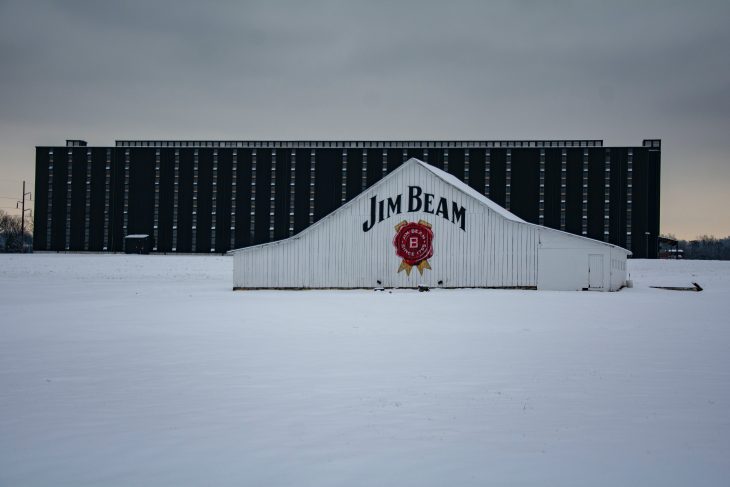
Answered: Does Whiskey Have Sugar and How Much?
As we have established above, whiskey does indeed contain sugar within it. This is sourced in part from the initial sugars that will be used for the fermentation process of whisky. However, this will only lead to some negligible traces of sugar within the whisky. Even these remnants will be eliminated during repeated processes of distillation though.
Despite this though, more sugars may be introduced to the whisky in other ways. Some of which include the ageing process, the addition of caramel colouring or the addition of sugar to create flavoured whisky or infused liqueurs are other ways in which excess sugar. As is the addition of sugary mixers such as fruit juice or Coca-Cola.
With all of the above in mind then, your average whisky will contain approximately nought point one grams of sugar per one hundred millilitres. However, when mixed in a standard ratio for a double whisky and coke, this will bring the sugar content of your beverage to around twenty-three point eight grams. Meanwhile, something like a whisky-based liqueur will contain around ten grams of sugar per one hundred millilitres of liqueur. Simultaneously, spiced whisky or flavoured whisky such as honey, apple or cherry bourbon will contain significantly higher amounts of sugar.
As you can likely tell from the information outlined above, regular whisky will have barely a trace of sugar. With that in mind then, if you are after a low sugar alcohol option, then whisky is a good choice. However, this is only the case when drunk, neat, on the rocks or with a sugar-free mixer. Even then though, excessive drinking should be avoided as it is unhealthy for obvious reasons but also due to the calories present within the alcohol itself.
FAQ – Does Whiskey Have Sugar and How Much?
In and of itself whisky doesn’t typically have a massive amount of sugar. In fact, it will typically contain approximately nought point one grams of sugar per one hundred millilitres. That said though, the amount of sugar that is contained within whisky drinks can vary somewhat. The factors for which being that it may be flavoured such as with honey, cherry or apple. Meanwhile, it may also be a spiced whisky or a whisky-based liqueur. Meanwhile, if you are mixing it with sugary mixers such as Coca-Cola or fruity juices the sugar content will drastically increase.
On its own, whisky won’t typically contain a massive amount of sugar. In fact, whisky will usually contain approximately nought point one grams of sugar per one hundred millilitres. As such, it will not increase your blood sugar in a significant way. That said though, due to the alcohol content it contains, whisky may actually lead to your blood sugar levels becoming noticeably reduced.
By itself, typically doesn’t really have a massive amount of sugar. In fact, whisky will usually contain around nought point one grams of sugar per one hundred millilitres. Additionally, it will also not contain any carbohydrates. That said though, it does contain calories due to the alcohol content. As such, if drank in excess, consuming whisky may still lead to weight gain.
Like with other types of alcohol, diabetics can drinks whisky perfectly safely. However, when doing so they will typically have to be more cautious than non-diabetics. The reason is that it can lead to lowered blood sugar and potential hypoglycaemia. As such, when consuming whisky or indeed any other type of alcohol when diabetic, you should avoid doing so on an empty stomach or as a replacement for meals. Additionally, you should also avoid binge drinking and keep track of blood sugar levels to avoid hypoglycaemia.
Recommended Reading
Why Is Whiskey Brown and How Does Whiskey Get Its Color?
All alcoholic drinks seem to have a rather iconic and noticeable color, with some exceptions being vodka, tequila, and other transparent ones
What’s a Whisky Dram? And How Much Whisky Is in It?
The term whisky dram is commonly used when talking about whisky. But what does it actually mean?
Aging Whiskey at Home: A DIY Guide
Aging whiskey at home does not require fancy barrels, licenses, or even mastery in the art of crafting whiskey. All you need is an open mind and some creativity.
What Does Whiskey Taste Like?
Whiskey is a favourite drink the world over. However, if you've never had it before then you may be wondering what does whiskey taste like?
Jack Daniel’s Bottle Sizes and Prices
Alongside the changes in Jack Daniel's bottle sizes, there are also understandable price changes. If you love Jack Daniel's whiskey as much as many other people do, learn more in this article.
The Best Bourbon Under $50
Prepare your palate for a flavorful journey, because this list of the best bourbon under $50 has some new and old favorites for you to discover.


